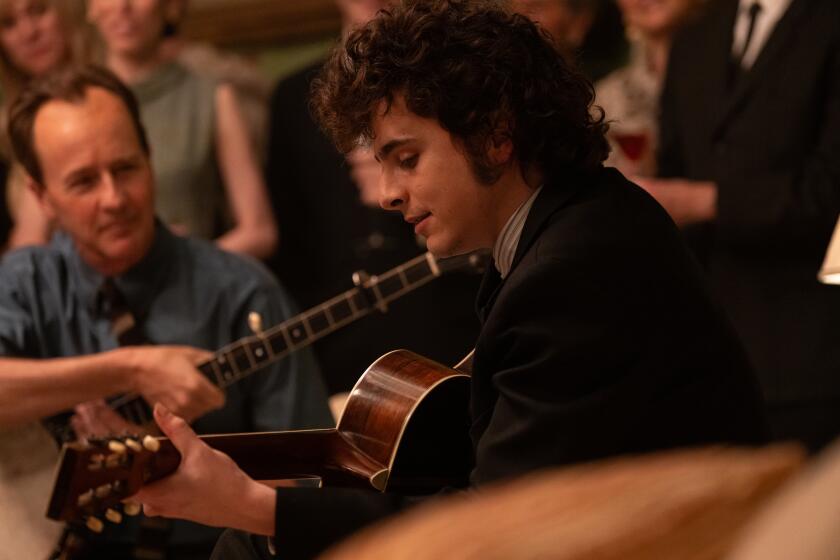‘Nine’ isn’t the sum of its glittery parts
- Share via
The man at the center of the universe in “Nine,” the sun around which a bevy of beautiful women will circle, needs to be irresistible, radiating heat. Unfortunately, Daniel Day-Lewis is more of a cool blue moon in a distant sky type, which has its own charm, just not one that works for this adaptation of the 1982 Broadway sensation, a musical / stage riff on Fellini’s classic “8½,” which featured a magnetic Marcello Mastroianni as the misdirected director in the middle.
And while we’re filling the suggestion box. . . . Because “Nine” is a musical, it would help if your leading man could sing, and I don’t mean carry a tune, but actually flex some vocal muscle. Again, love Daniel Day-Lewis, excellent racing shirtless through the forest, but a song-and-dance man he is not.
So what does that leave “Nine” with? Well not much.
The galaxy of actresses who should bring some sizzle feel kind of chilly too. Maybe that’s the fault of the fishnets and bustiers, which is what the film relies on to keep your attention rather than a story, disappointing since the script was in the hands of Michael Tolkin (“The Player”) and the late Anthony Minghella (“The English Patient.”). What makes all these fumbles surprising is that director Rob Marshall knows his way around musical theater, hitting his highest notes with Oscar best picture winner “Chicago.”
The story here is loosely based on director Federico Fellini’s experience. At middle age, the Italian auteur found himself with a bad case of writer’s block; while the words wouldn’t come, a lot of memories about the women he had bedded did. No surprise, thinking about the women was easier than working on a script, but ultimately the two merged to provide the foundation for “8½,” which follows a middle-aged filmmaker with writer’s block and many women as he tries to find his way back to the mistress he loves the best, his work.
But what in Fellini’s hands became a classic -- its black comedy deconstructing the artistic temperament -- only to survive an initial translation to the stage, now returns home to film as a fiasco.
As Marshall did very well in “Chicago,” he tries again in “Nine,” giving the film’s action a life that is both cinematic and stagy, and I mean stagy in a good way. He begins by taking the aesthetic power of a story unfolding on stage with its mostly static sets and lots of dramatic lighting.The scenes with Day-Lewis on a soundstage -- all that yawning space just waiting for a vision -- are beautiful. But the beauty is only skin deep.
Then just as that ‘but wait, this is a movie” feeling kicks in, Marshall sends his actors, the action and the rest of us into a real world filled with streets and cars and crowds. But the real world is a dangerous place, and so it is here, jarring and unnerving for everyone, actors included.
Fellini’s piece was set in the ‘60s, and Marshall keeps it there. When it comes to the movie business, which is a large part of what this story is about, 2009 is a very different place. Paparazzi, a word Fellini popularized in his 1960 film, “La Dolce Vita,” has grown into a monster with TMZ tentacles everywhere. So one of “Nine’s” central themes -- that the director has a mistress on the side that his wife might discover -- hasn’t shocked in years. Now maybe if Guido had been a golfer. . . .
The starting gun in “Nine” is the industry’s version of a firing squad -- a press conference. As flash bulbs pop, famous director Guido Contini (Day-Lewis), who’s had a few recent flops, goes about deflecting the barbed questions with a blend of boredom and arrogance, though maybe that’s the same thing. Regardless, there are scenes when the jaunty fedora is pulled so low, you wonder if he’s dozing off.
Guido’s passive nature really doesn’t suit Day-Lewis any better than hot sun. Charisma, though, the self-deprecating sort that pulls you close, would have been a better choice for Guido, particularly when he’s in the company of women who are supposed to be beguiled.
As to those women, Marshall has gathered up an eclectic group, including the nice touch of casting Sophia Loren, who may be the only one in the film with a real Italian accent, as Guido’s mother. They spend the film spinning in and out of his orbit, helping the troubled artist work through his issues, mostly at the seaside hotel where he’s escaped to try to sort himself out.
The closest “Nine” comes to a showstopper is Fergie as the prostitute whose early influence shaped Guido’s passions. The intensity and energy she brings to “Be Italian,” coupled with the staging and the leggy dancers, make it the one musical set piece that feels Broadway worthy, although Hudson belting out“Cinema Italiano” comes close.
Cotillard as Guido’s wife, so fierce as Edith Piaf in “La Vie en Rose,” gets to play pretty and soft, which is nice to see and she’s lovely at it. On the other hand, the movie star role is not much of a stretch for Kidman.
“Nine” is one of those films that couldn’t look better on paper -- so many Oscar, Tony and Grammy winners involved that the production should have literally glittered with all that gold. But in the end, nothing adds up. Perhaps “Zero” would have been a better name.
More to Read
Only good movies
Get the Indie Focus newsletter, Mark Olsen's weekly guide to the world of cinema.
You may occasionally receive promotional content from the Los Angeles Times.










